Random Reviews: Plutona
Though hampered by a truncated conclusion, Plutona engagingly explores what happens when the superhuman mingles with a coming-of-age narrative
—by Nathan on September 26, 2024—
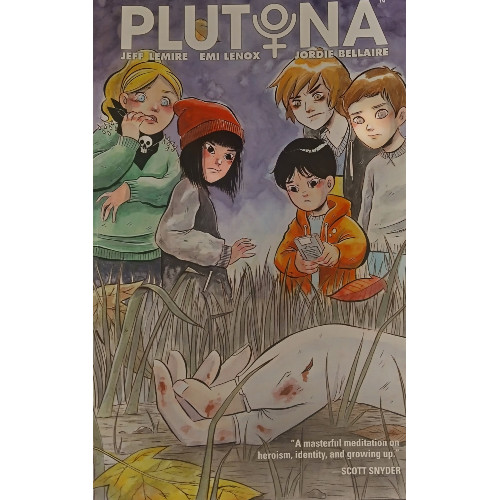
I didn't grow up in a neighborhood where I had many friends…really, any friends after a certain age. Lots of family turnover with the houses around us, and I never ventured much past our dead-end street to find playmates my own age. Oh, I had friends, I just never had that group of buddies who lived a few houses down who you'd ride bikes with all over the neighborhood when you were growing up. I didn't have friends like that.
Wouldn't have been much to explore even if I had a cluster of close comrades. Our neighborhood housed no persnickety old men who everyone assumed killed their wives forty years earlier. There was no great, dense patch of forest where kids could go scrambling over branches and fallen trunks or splashing in streams. There were no abandoned homes rumored to be haunted with all the windows broken by teenagers taking potshots with rocks. So no real chance of running afoul of potential murderers, twisting my ankle in the depths of the woods, or getting the snot scared out of me by a spooky, decaying house.
It also limited the chances of coming across any dead bodies unexpectedly. Cause if you're with a group of friends and you find a body in the middle of nowhere, the question you're faced with after wondering through all the Who? What? When? Where Why? and How? stuff is What the heck are we gonna do now?
Plutona
Writers: Jeff Lemire, Emi Lenox
Pencilers: Emi Lenox, Jeff Lemire
Inker: Emi Lenox
Colorist: Jordan Bellarie
Letterer: Steve Wands
Issues Collected: Plutona #1-5
Volume Publication Date: July 2016
Issue Publication Dates: September-October 2015, December 2015, February 2016, June 2016
Publisher: Image Comics
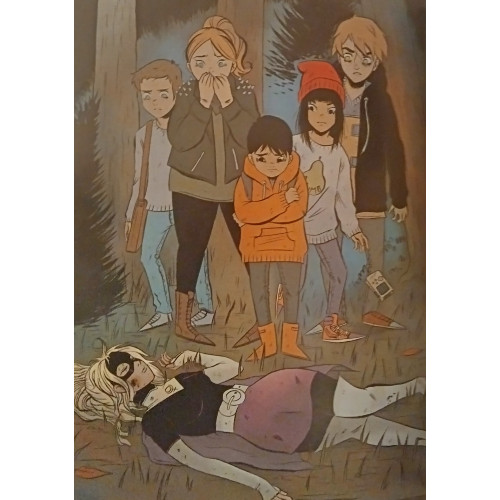
If you read other reviews of Plutona, you'll notice the most often fictional comparison to this limited series is the coming-of-age film Stand by Me, the cinematic adaptation of Stephen King's The Body. And, yes, some of the comparisons are apt: both stories follow young kids from dysfunctional homes who interact with a body. In Stand By Me, the narrative centers around that journey to the body and how the boys involved bond together and face adversity along the way. As the first issue of Plutona closes, our five protagonists–Teddy, Diane, Ray, Mie, and Mie's brother Mike–discover the body of world famous superhero Plutona in the middle of the woods. They're not looking for her. They just stumble upon her. The proceeding narrative focuses less on the adventure and more on how these kids react to the circumstances they have found themselves in unexpectedly…and what those circumstances reveal about each kid as they respond.
For a superhero comic, Plutona features very little heroics. A "back-up feature" at the end of each issue follows Plutona as she gears up and fights her final battle, complete with Stan Lee-esque dialogue intentionally dialed up to 11. These are the only pages where heroes and villains battle; the rest of the narrative is saved for the kids, who live in a world where heroes exist but where such actions have very little actual impact on their lives. The first chapter's second page is a double-page spread of a lush forest with a mountain in the distance, showcasing how separated the kids' small town is from the big city, where it's assumed most of the action happens. The kids may know about superheroes–Teddy's interest in them is displayed as borderline obsession–but rarely does the fantastical just drop into their laps.
Until it does.
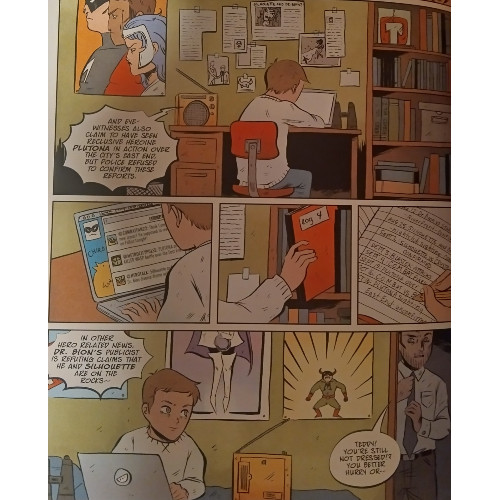
The far-off world of superheroes, despite being a handful of miles down the road, has suddenly become closer and far more real. And yet, the narrative doesn't bring the kids much deeper into this grand realm of fantasy–no other heroes appear, no villains swoop in to demand Plutona's body. It's as if, removed from the chaotic metropolitan space, the world is largely closed off to the amazing and incredible, and just because Plutona has unexpectedly breached the barrier between the mundane and the marvelous, it isn't as if the small town these kids reside in is altered forever, at least not in any way that seems physically, culturally, or politically significant. This isn't one of those "everything you know is a lie" or "a stranger comes into town and changes everything" kinds of stories.
Plutona's sudden reappearance does indicate a shift in tone, but this shift is limited to the kids as they must decide how to handle the situation. They're young, shocked, scared. Some consider the fame angle–how cool would it be to post a picture of yourself with a superhero's corpse?–while others argue against letting anyone know, even the authorities. They're not even all that concerned with the aforementioned Who? What? and Why? style questions. We're not given much of a mystery to solve–the question of Plutona's demise lingers in the background, but it never becomes the focus–and the argument could made that the central concept of "Plutona's demise" is merely a catalyst for the deeper story developing.
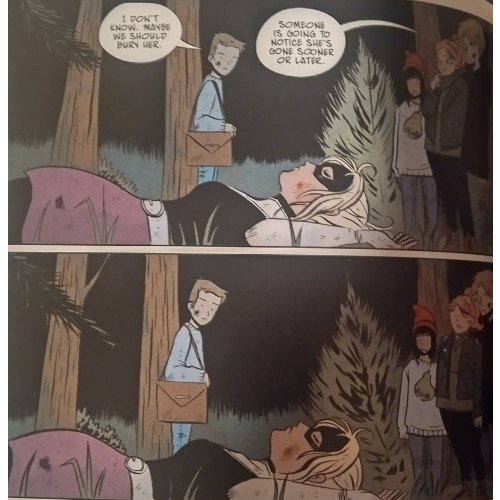
Until this incident, some of these young adults never interact much, Plutona inadvertently pulling them together…while keeping them apart. This is not, contrary to what you may expect, a group of close knit friends. Connections exist, but the fundamental trusts, shared experiences, and common interests don't tether these five deeply together. Even the biologically related characters, Mie and Mike, aren't all that close, Mike shuffling alongside his sister simply because she's his sister…and Mie begrudgingly taking responsibility to watch him because, well, she's his sister. Where other stories may place a bunch of close comrades into a conflicting situation which ends up dividing them or at least challenging the fabric of their friendships, these kids have no such unity. It's not their friendship which is risked by navigating this strange situation. Each child is motivated more by their own needs rather than considering the collective–Ray dreams of fame, while Mie deflects a desire for attention, while Teddy pursues his own, geek-centric line of thinking.
And yet some change is necessary, even if we don't necessarily watch the growth or demise of the collective. Individual relationships are instead affected–Mie grows closer to Ray, which has an impact on her friend Diane, even if the budding friendship has little to no impact on Teddy and Mike. Teddy takes more of an interest in Mike, but this is presented as mere causation and not a result of Mie looking after her brother or because of her more frequent associations with Ray (at least, not in any way beyond implication). Teddy pushes back against Ray's bullying, his confidence growing as he realizes his own purpose through the Plutona situation.
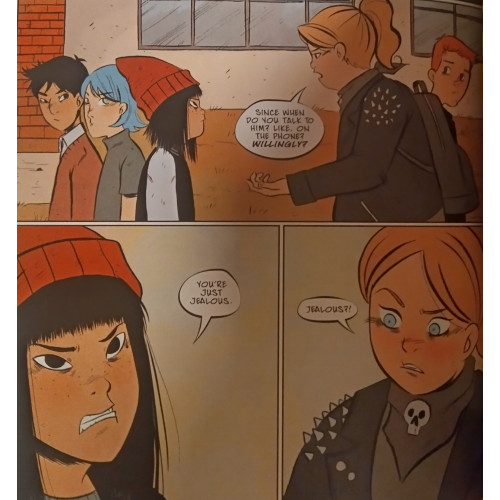
I can't specifically say how or why these changes occur, especially with one or two significant characters, as such revelations would spoil the plot. Yes, all changes are specifically precipitated by the kids finding Plutona, but some of these changes stem from "We found a dead body" and others sprout from "We found a dead superhero." You know from the start, essentially, each kid will somehow be impacted by the general situation…and, knowing that, you're encouraged to follow the plot across additional chapters to discern what those precise changes will be.
There is, ever so slightly, a larger plot bubbling in the background, and though it naturally extends from Jeff Lemire's characterization, it culminates in an ending which feels somewhat cliche, particularly in how it's illustrated. The series' climactic moment at the end of its penultimate issue, though tense, utilizes some sleight-of-hand to disguise a singular moment which, to me, feels forced by penciler Lenox. Moment A doesn't necessarily feel like it would lead to Moment B, asking the reader to suspend some disbelief in accepting the outcome. A character is forced to accept the consequences of certain actions which, given the circumstances and context, feels a tad too harsh. Judgment is passed instead of a chance at mercy or redemption, and though I can understand utilizing such a ploy to evoke an emotional resonance from the audience, it ends up being a tad too depressing a moment for the series to provide any feeling other than forced solemnity.
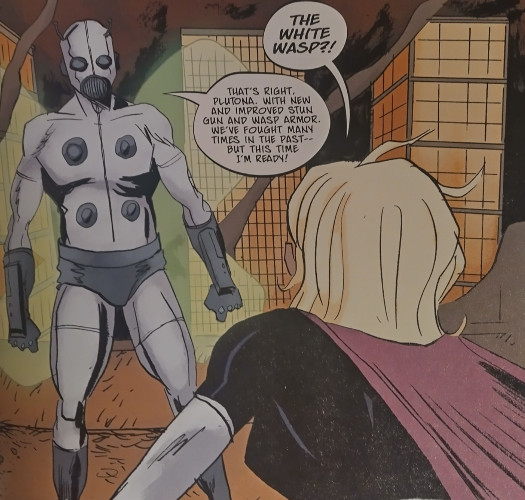
Elsewhere, Lenox achieves a befitting art style, a more streamlined version of Lemire's own palette. There's a childlike quality to the book, belaying its darker tones, which wouldn't look out of place were this series adapted for animation (my dad, seeing the cover, wondered aloud if I was reading an Over the Garden Wall adaptation). Lemire, I believe, provides pencils during interstitial sequences focusing on Plutona before the kids discover her–I say "I believe," because the volume I own does not list him as a penciler, but the art is so similar to Lemire's, I have to trust it's his; if it's not his pencils, it's the greatest imitation of his style Lenox could pull off. These flashback sequences provide Plutona necessary depth, adding an angle of tragedy in short sequences which help develop her character and a bit of her world; each segment is short enough to never encroach upon the primary story but offer enough detail for anyone wondering why readers should care about the titular superhero.
I found Plutona in a used bookstore and picked it up on a whim without knowing anything about the story–similar to how I grabbed Buzzkill because of my familiarity with Donny Cates and Geoff Shaw's God Country, I gave Plutona a shot because I knew Lemire from Sweet Tooth and Essex County (both of which I'll endeavor to review at some point in the unknown future). This is a short, easy to read series. As a result, the ending does feel a tad rushed and slightly difficult to believe, but otherwise, Plutona is a worthy dissection of the genre; by shifting its focus away from the heroic, Plutona aptly explores what happens when superhuman spectacle grazes the normal world…and the consequences which that tangential touch ultimately brings, told through the eyes of children who were just exploring the world the way kids are supposed to.